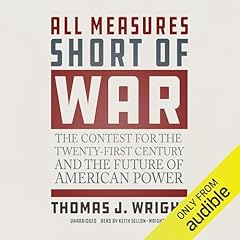
The Dispensable Nation
American Foreign Policy in Retreat
No se pudo agregar al carrito
Solo puedes tener X títulos en el carrito para realizar el pago.
Add to Cart failed.
Por favor prueba de nuevo más tarde
Error al Agregar a Lista de Deseos.
Por favor prueba de nuevo más tarde
Error al eliminar de la lista de deseos.
Por favor prueba de nuevo más tarde
Error al añadir a tu biblioteca
Por favor intenta de nuevo
Error al seguir el podcast
Intenta nuevamente
Error al dejar de seguir el podcast
Intenta nuevamente
 Exclusivo para miembros Prime: ¿Nuevo en Audible? Obtén 2 audiolibros gratis con tu prueba.
Exclusivo para miembros Prime: ¿Nuevo en Audible? Obtén 2 audiolibros gratis con tu prueba.
Elige 1 audiolibro al mes de nuestra inigualable colección.
Acceso ilimitado a nuestro catálogo de más de 150,000 audiolibros y podcasts.
Accede a ofertas y descuentos exclusivos.
Premium Plus se renueva automáticamente por $14.95 al mes después de 30 días. Cancela en cualquier momento.
Compra ahora por $18.00
-
Narrado por:
-
Stephen Hoye
-
De:
-
Vali Nasr
Vali Nasr, author of the groundbreaking The Shia Revival, worked closely with Hillary Clinton at the State Department on Afghan and Pakistani affairs. In The Dispensable Nation, he takes us behind the scenes to show how Secretary Clinton and her ally, Ambassador Richard Holbrooke, were thwarted in their efforts to guide an ambitious policy in South Asia and the Middle East. Instead, four years of presidential leadership and billions of dollars of U.S. spending failed to advance democracy and development, producing mainly rage at the United States for its perceived indifference to the fate of the region.
After taking office in 2009, the Obama administration had an opportunity to fundamentally reshape American foreign policy, Nasr argues, but its fear of political backlash and the specter of terrorism drove it to pursue the same questionable strategies as its predecessor. Meanwhile, the true economic threats to U.S. power, China and Russia, were quietly expanding their influence in places where America has long held sway.
Nasr makes a compelling case that behind specific flawed decisions lurked a desire by the White House to pivot away from the complex problems of the Muslim world. Drawing on his unrivaled expertise in Middle East affairs and firsthand experience in diplomacy, Nasr demonstrates why turning our backs is dangerous and, what’s more, sells short American power. The United States has secured stability, promoted prosperity, and built democracy in region after region since the end of the Second World War, he reminds us, and The Dispensable Nation offers a striking vision of what it can achieve when it reclaims its bold leadership in the world.
Los oyentes también disfrutaron:




















sensible
Se ha producido un error. Vuelve a intentarlo dentro de unos minutos.
Thorough analysis of the US role in Middle East
Se ha producido un error. Vuelve a intentarlo dentro de unos minutos.
If you could sum up The Dispensable Nation in three words, what would they be?
I'm confident, given his experience, that the author has valuable insight, but from the Prologue to Chapters 1 and 2, there was so much condemnation with such little supporting evidence that I could not continue listening. For example, in Chapter 2 (Ch 3 in audio download) he states Karzai's brother had "ties to the drug trade...giving them the means to line their pockets while abusing the local population." But he never describes what those ties were, what methods they were using to line their pockets, or how they were abusing the local population. Had he taken more time to provide concrete information less emotional retoric, this could have been a good book, but I cannot recommend it.What do you think your next listen will be?
A more objective review of the history of the Middle East.Mostly general assertions & little evidence
Se ha producido un error. Vuelve a intentarlo dentro de unos minutos.


